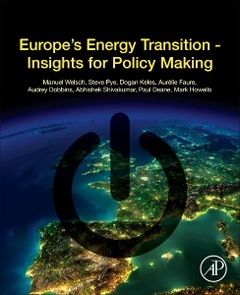Europe’s Energy Transition Insights for Policy Making
Auteur : Welsch Manuel

Europe?s Energy Transition: Insights for Policy Making looks at the availability and cost of accessing energy and how it significantly affects economic growth and competitiveness in global markets. The results in this book, from a European Commission (EC) financed project by INSIGHT_E, provide an overview of the most recent analyses, focusing on energy markets and their implications for society. Designed to inform European policymaking, elements of this book will be integrated into upcoming EC policies, giving readers invaluable insights into the cost and availability of energy, the effect of price increases affecting vulnerable consumer groups, and current topics of interest to the EC and ongoing energy debate. INSIGHT_E provides decision-makers with unbiased policy advice and insights on the latest developments, including an assessment of their potential impact.
Section I: Introduction1. Europe’s Energy Transition2. Insights for Policy Making - About this Book3. INSIGHT_E - A Think Tank Informing the European Commission
Section II: Europe’s Energy Policy Landscape4. Introduction: Europe as a Consuming Region5. The European Union on the Global Scene - A Snapshot6. European Energy Policy Objectives7. A Market-Based European Energy Policy8. Conclusions
Section III: Energy Supply: A Changing Environment9. Introduction10. Decarbonizing the EU Energy System11. Gas Security of Supply in the European Union12. Biofuels for Aviation: Policy Goals and Costs13. Conclusions and Outlook
Section IV: Impact of Renewable Energies on Market Operation and Design14. Introduction15. Curtailment: An Option for Cost-Efficient Integration of Variable Renewable Generation?16. Impact on Electricity Markets: Merit Order Effect of Renewable Energies17. Market Design Options for Promoting Low-Carbon Technologies18. Case Study: Design Options for the German Electricity Market19. Conclusions and Outlook
Section V: Reliable and Flexible Energy Systems20. Introduction21. Need for Flexibility and Potential Solutions22. Storage Solutions and Their Value23. The Role of Fuel Cells and Hydrogen in Stationary Applications24. Need for Reliability and Measuring Its Cost25. Conclusions
Section VI: Society and Consumer Demands26. Introduction27. Self-Consumption of Electricity from Renewable Sources28. DC Power Production and Consumption in Households29. District Heating in Europe: Opportunities for Energy Savings, Business, and Jobs30. Energy Poverty Across the EU: Analysis of Policies and Measures31. ConclusionsSociety and Consumer Demands—Abbreviations, Acronyms, and Initialisms
Section VII: Europe’s Energy Transition: Challenges and Insights for Policy Making32. Introduction33. Key Challenges Ahead34. Developing the Policy Package35. Research Priorities
Energy engineers, transmission system operators, industry manufacturers, research Institutes, energy agencies, regulators
- Presents answers to strategic questions posed by the European Commission
- Coherently assesses the energy transition, from policies to energy supply, markets, system requirements, and consumer needs
- Informed the EC "Clean Energy for All Europeans" package from end of 2016, e.g., regarding aspects of energy poverty
- Endorsed by thought leaders from within and outside of Europe, including utilities, energy agencies, research institutes, journal editors, think tanks, and the European Commission
Date de parution : 04-2017
Ouvrage de 354 p.
19x23.3 cm
Thèmes d’Europe’s Energy Transition :
Mots-clés :
AC-DC; Aviation; Battery storage; Biofuels; Business models; Capacity market; Capacity remuneration; Climate change; Climate policy; Consumer affordability; Consumers; DC networks; Decision-making; Decrease of costs by curtailment; Definitions; Demand response; Direct current; Direct current networks; District heating; District heating and cooling; EU ETS; Electricity; Electricity storage; Electricity supply security; Electricity target model; Energy; Energy Union; Energy and climate policy; Energy dependency; Energy efficiency; Energy market; Energy policy; Energy policy challenges; Energy poverty; Energy prices; Energy savings; Energy security; Energy storage; Energy supply; Energy system costs; Energy transition; Energy-only market; Energy-only-market; European Commission; European Emission Trading Scheme; European energy market; European energy package; European energy policy; Final energy consumption; Fuel cells; Generation adequacy; German electricity market; Grid security; Heat and power generation; Heating and cooling; Households; Hydrogen; ICT; INSIGHT_E; Increase of renewables; Indicators; Market design; Market design based on levelized costs; Market integration; Markets; Merit order effect; Missing-money problem; Observatory; PV; Penetration of variable renewables; Policy reforms; Potential; Power system flexibility; Power system reliability; Power-to-gas; Price reduction; Primary energy production; Prosumer; Pumped hydro storage; Reliability; Renewable energy; Renewable energy curtailment; Renewable policy; Renewable sources; Renewables; Renewables policy; Research needs; Security of electricity supply; Security of supply; Self-consumption; Shale gas; Structure of book; Substituting conventional generation; Supply interruption costs; Supply security and reliability; System decarbonization; Target audience; Think tank; Transport; Variable renewables



